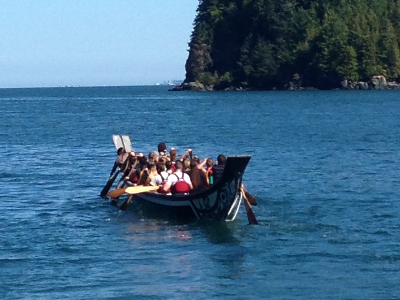

Start date: Thursday, March 31 2022.
Schedule:
On Thursday, March 31, 2022, from 6:30 PM to 7:30 PM
Resource person: learn@vandusen.org
Location: Via Zoom
Description:
About the presentation: The term ‘biocultural diversity’ suggests that the web of life is made up of both the diversity present in the natural world and also the diversity of human cultures and languages, and that these are interrelated and interdependent. Historically, human societies have developed within specific ecologies, and then co-adapted with them. Human cultures and languages have developed in symbiosis with local environments, expressing and communicating place-based values, beliefs, knowledge, and practices. Indigenous and other traditional societies usually hold the idea of a ‘oneness with the natural world,’ which the concept of biocultural diversity seeks to capture. More specifically, it considers that people are a part of, not apart from nature and have a responsibility to steward the life system that sustains them. In this talk, David Zandvliet and Luisa Maffi will consider the origins and meaning of the concept of biocultural diversity and discuss its implications for education through several illustrative case studies from Indonesia, Haida Gwaii and Vancouver. About the speakers: David Zandvliet is a Professor in the Faculty of Education at Simon Fraser University (Vancouver, Canada) and Director of the Institute for Environmental Learning. He has held additional appointments as an associate faculty member and teaching fellow in the Faculty of Environment (SFU) and is currently an associate member in the Faculty of Science (SFU). He was recently appointed to the newly established UNESCO Chair in Bio-cultural Diversity and Education. An experienced teacher and researcher, David has published numerous articles in international journals and presented refereed conference papers on six continents and over 17 countries. His career interests lie in the areas of science and environmental education. He has considerable experience in the design and evaluation of classrooms and in provision of teacher professional development. He has conducted research and development on physical and psychosocial learning environments in Australia, Canada, Indonesia, Malaysia, Sri Lanka and Taiwan. Luisa Maffi, PhD, is a linguist, anthropologist, and ethnobiologist and one of the pioneers of the concept and field of biocultural diversity. In 1996, she co-founded Terralingua (https://terralingua.org), an international nonprofit devoted to research, education, and awareness raising on the vital value of biocultural diversity for life on earth. She has directed Terralingua for the past 25 years and is the editor of the organization's flagship publication, Langscape Magazine (https://terralingua.org/langscape-magazine/read-langscape/), which publishes written and visual stories about biocultural diversity from all over the world. Her books include On Biocultural Diversity: Linking Language, Knowledge, and the Environment (Smithsonian, 2001) and Biocultural Diversity Conservation: A Global Sourcebook (Earthscan/Routledge, 2010).
Available: Available
Price: $12.00 Taxes not included
Notes: Pre-registration is required. This course will take place online, and recordings will be available for a limited time to participants. Online course log-in details will be sent 24 hours before course date.
More information: Speakers: David Zandvliet & Luisa Maffi
Share this activity:
